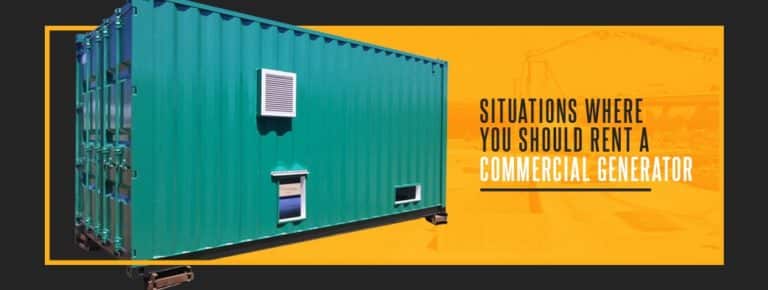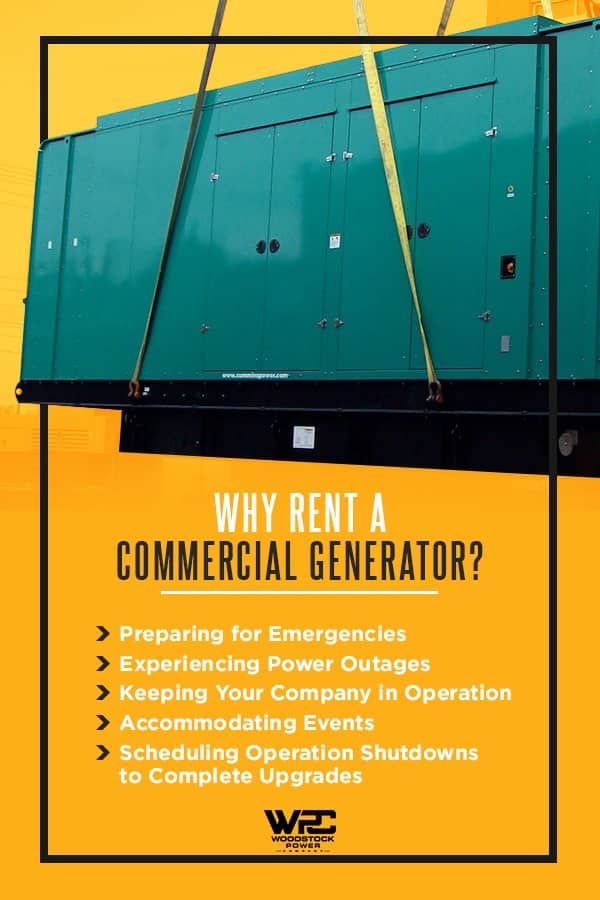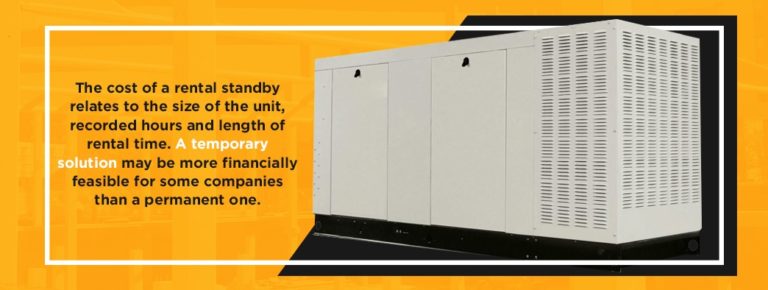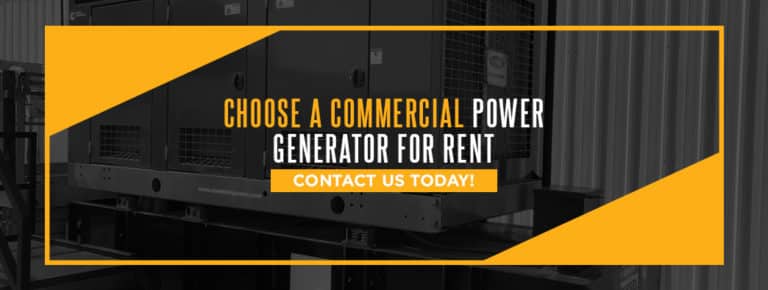Situations Where You Should Rent a Commercial Generator

Power generation needs can pop up at any moment. Whether it’s to backup your business or facility during a power outage to keep operations running smoothly, projects located off the main power grid, remote events that aren’t located near a primary power source, whatever the situation – nothing’s worse than not having what you need during the most critical times — especially when it comes to consistent electrical power for your business. In situations where you require a commercial generator, Woodstock Power Company can support you through the entire process.
Rentals are an excellent solution for a variety of situations and industries, no matter if you’re in the construction, education, hospitality, mining, events or commercial & industrial property management sectors. Generator rental programs deliver fast fixes if you run into an emergency or if you need power for a one-time project. They can also serve as temporary solutions until you find a permanent one.
Check out our commercial generator rental guide to discover the reasons to rent a generator, what type and size of unit to choose and other essentials to take into consideration.
Why Rent a Commercial Generator?
Why and when to rent a commercial generator boils down to your specific requirements and application. In many cases, commercial generators help keep business production afloat and daily operations running smoothly after blackouts occur. They can also support your business in other situations such as disaster recovery due to natural disasters or special events, and even scheduled maintenance to the local utility grid.

The purpose of rental generators is to help prevent you from experiencing diminished productivity, lost data, stalled production lines or decreased revenues when you seek more power than what’s available. Rental generators also play a key factor in disaster recovery efforts to help get your business and local community back up and running.
1. Preparing for Emergencies
Unexpected and dangerous circumstances put your operations at risk. When a disaster strikes, you need reliable backup power from commercial generator rentals to ensure your establishment doesn’t experience losses.
The first step is to have a plan for power outages. Because your business depends on a reliable power source, you need to determine what you would do in the case of a blackout and what the best way to implement the plan is. You never want to wait until an actual predicament to begin thinking.
Preparing for emergencies also means partnering with a reputable dealer. It’s important to work out a plan before any outages strike in order to seamlessly implement contingency measures to mitigate any downtime or potential losses due to power outage. Consider the electrical connections, generator placement, and cable routing before creating a strategy. Your disaster tactic plan should ensure speedy connections and uninterrupted business workflow.
A commercial generator rental can deliver reliable and consistent power during various types of severe conditions and natural disasters, including hurricanes, ice storms, heavy snowfall, tornadoes, and earthquakes.
2. Planned Power Outages
An increasing trend among power companies in areas that experience natural disaster are planned power outages. These planned outages are scheduled by the utility companies to shutdown services when there is risk of a natural disaster occur. This process is implemented to mitigate further damage or catastrophic conditions when there is a dangerous natural disaster threatening the area.
For example, as of Oct. 28, 2019, about 2.4 million people lost power over a span of several days due to the raging fires. Approximately 1.2 million people were also affected by intentional shutoffs due to these planned power outages. The overall number of people impacted reached a staggering 2.7 million, whether they experienced power outages from winds and fires or from turned off electricity.
This has led to an increasing need for generator rentals to help provide power for key equipment, emergency systems, communications systems, and daily commodities.
3. Experiencing Power Outages
In the case of a power outage due to the aging power grid, utility failure, natural disasters, severe superstorms, or man-made disasters, generator rentals are ideal for facilities that rely on constant power, but don’t have a permanent commercial generator.
They are also suitable if your current standby unit can’t accommodate blackouts that occur regularly. You could even be in the process of finding an upgraded system and need a temporary solution until you find a new one, which is where rental units come into play.
Blackouts can come at any time and result from strain on the power grid, severe weather, and other conditions. It doesn’t matter if you run a small operation or massive facility, companies can suffer during power outages, especially when work must continue without interruption. Counting on a rental generator is the best way to support your bottom line.
4. Keeping Your Company in Operation
Throughout certain times of the year, some companies experience a period where they cannot afford to stop working. It can often relate to different seasons in which you have the highest production rates or the number of clients. For example, farmers who rely on grain dryers for busy harvest seasons might need a generator. It can deliver additional power to help them remain productive. Rental units can also aid in distributing more power to distant sites.
Other industries that benefit from reliable power are manufacturing plants, healthcare companies, and remote construction sites. Our solutions help keep production lines moving, machines running and equipment working. Rentals can support various load requirements of any sector when you need to boost your power.
5. Accommodating Events
From weddings, fairs, conferences, festivals and outdoor celebrations to holiday parties, sporting events, product launches, and charity occasions, hosting a special event can place extra tension on your electrical supply when it’s at your business’s location.
Additional appliances, systems, and equipment can demand more energy than usual, causing overloads. Items like lighting equipment, sound devices, space heaters, air conditioners, decorations, and food storage can increase the electrical load. In any situation, it would be detrimental to lose power or not have enough to create a successful event. Without the proper generator, you can lose profits and potential customers.
Special events may also occur in remote locations that don’t have a power supply from the primary grid. Rental generators can serve as a source of electricity, making them ideal for any entertainment venue.
Commercial solutions are your go-to for whatever you’re planning because they provide a primary source of energy. A genset can keep things operating while also ensuring a safe environment, whether the affair is all day or night.
6. Scheduling Operation Shutdowns to Complete Upgrades
Many large companies need to conduct upgrades to their electric equipment periodically. They do so if they need to meet increasing load requirements or to complete maintenance on a more extensive scale. If you perform upgrades, you need to schedule a planned blackout. This doesn’t mean you have to stop working, however. You can use a rental generator to ensure production continues to flow.
Renting a standby unit can deliver an ideal solution to the shutdown by providing continuous power until the usual source is ready.
The reasons to rent a commercial generator come down to demanding continuous or additional electrical power. When you find yourself in the middle of a blackout or disaster, or if you need more energy to sustain your operations, Woodstock carries a line of rental solutions that can meet your needs.
Types of Rental Generators
Determining what generator best matches your needs begins with knowing four components — the electrical capacity necessary, how long you need the standby, the location of the unit and what fuel it will run on.
Do you need a portable diesel, natural gas generator/propane generator? Portable diesel generators are the most commonly used generators in the rental market. While there are portable form factors for natural gas/propane generators, they are a lot less common when compared to their diesel counterparts.
Diesel generators have about a 95% chance of surviving a power outage in the U.S., and a natural gas option stands at a 97% survival rate. Both are reliable commercial power sources.
Diesel generators are one of the most commonly in the market for emergency backup power, including both standby and rental needs. Diesel generators are versatile and can be used across various industries, applications, and require less overall maintenance between usage intervals. Though a drawback of diesel generators would be their fuel capacity. A diesel generator’s run-time is limited to the maximum fuel capacity of the unit. While many generator rentals come with an on-board diesel base tank, it would be beneficial to look into diesel storage tanks that can be used as a source of backup fuel to have on-hand. If storing a diesel storage tank is out of the question, it is important to establish a system to replenish diesel fuel to keep the generator in operation.
Natural gas generators for generator rentals are not as commonly available or used by many, but there is a market available. Natural gas generators are often converted to run off of propane, allowing greater flexibility in terms of transporting the generator around from location to location. Propane is fairly easy to obtain and it’s usually a quick process to refuel a propane tank vs a diesel storage tank. An item to look out for is that natural gas/propane generators require greater maintenance at more frequent intervals due to being spark-ignitions and spark plugs that could go bad. Natural gas/propane generators also have tubes and fuel lines that must be inspected regularly due to the fuel source. Over time, tubes and fuel lines can develop cracks or tears, which can allow gas to slip out and create a dangerous operating environment.
Generators also have cooling systems — either air or liquid. Because the machine produces an excessive amount of heat when running, the cooling system helps avoid overheating. Air-cooled systems are for smaller gensets, and liquid systems are ideal for industrial generators. Most generator rentals come equipped with a cooling system that is manufactured to keep the generator rental running at max performance.
What about a one vs. three-phase generator? One-phase often relates to minor units for homes, and three-phase refers to commercial rentals for industrial work. When working with a generator dealer, be sure to go over items that require power in order to ensure that you’re selecting the right generator for your power needs.
Sizing a Rental Generator
The power of a generator relates to the size as well as the cost of a unit. For example, if you need the most amount of energy available, the bigger, the better. You measure the amount of output of an engine in watts or kilowatts.
The first procedure in determining the size you need is figuring out the kilowatts necessary for your situation. You can calculate the wattage by multiplying the volts by amps for an accurate reading, helping you decide on the required power output.
Do you need the generator to power several critical functions of your corporation or the entire operation? Some individual services may include lights and pumps, computer systems, emergency, and safety equipment or HVAC systems.
While it’s important to consider power requirements and run power calculations before you get started, it’s important to work with a reputable dealer so that you don’t rent a generator that’s the wrong size. If you invest in a unit that has a larger capacity than what your source needs, you can lose excess power and waste money. If the genset doesn’t have enough output energy, you run the risk of losing productivity.
Advantages of Generator Rentals
Renting vs. buying is always the biggest question, but the answer is not black and white. Whether you need a short-term solution or a unit that supports you full-time depends on your application, financial outlook and project timeframe.
Renting is most advantageous when you need a generator for a short period because it’s more cost-effective. You wouldn’t want to rent for extended periods because it would eventually overcome the price of buying new or used.
Location and space is also another advantage. Some businesses or facilities cannot accommodate the installation of a permanent standby generator on-site due to space, zoning, or size requirements. Generator rentals are usually trailer mounted with heavy-duty wheels on wheel axles that allow for easy transport of the generator from place to place.
Generator rentals are also ideal for mobile projects as well as disaster relief solutions. When natural disasters occur and either your current generator fails, or if you don’t have one at all, rentals can provide relief by returning power to organizations, facilities, companies, and hospitals. They can keep you afloat until the original power source returns.
The cost of a rental standby relates to the size of the unit, recorded hours and length of rental time. A temporary solution may be more financially feasible for some companies than a permanent one. Renting equipment is ideal for businesses starting up that don’t have the means to invest in a more expensive asset.

Another plus of rentals is that you can request them for various frequencies depending on your needs. Projects ranging from a one-time event and several days to a few weeks and months can benefit from electrical power rentals. One other benefit of renting is that the rental company is responsible for maintaining the generators. Generator rental companies must service, maintain and test machines so that they are the most economical solution and operate at peak levels.
The advantages of working with rentals give you more freedom and reduce the strain on your finances. Knowing what’s best for your business’s bottom lines is crucial to staying productive in various situations.
Considerations of Renting Standby Equipment
Step-by-step, you’re able to understand more about when and how to rent generator equipment. Here are a few more elements to consider.
- Pre-requisites
- Available space
- Average and peak power supplies
- Exhaust restrictions
- Portable vs. stationary power
- Fuel preference
- Standby vs. prime generators
While the process of actually renting a generator is simple, the process of actually using it isn’t. If you’re using a rental generator to help backup your business or facility, it’s not a simple process of plug & play. The building’s electrical circuits must be configured properly for the facility to receive power from the generator. This is usually done by a master electrician who can handle the cabling and conversion process. A master electrician will also be required to set up the generator rental when it arrives on-site unless your business has an electrician on staff that can handle the process.
Think about the startup of the unit. As a general rule of thumb, the motor will need about three times more watts to start as opposed to what’s needed for the generator to operate. You will want to determine the maximum amperage and correct voltage that you require.
You also don’t want your rental to trip a circuit breaker or experience a power failure. Consider the environment of your jobsite — if you’re indoors or at an event that requires a quiet generator, a portable option may serve you best. If you need a solution installed outside, commercial diesel solutions are ideal.
No matter where you place your generator, safety should be at the forefront of your considerations. Many units have a ground fault circuit interrupter — GFCI — defense system that helps protect against electrical shocks. The GFCI shuts off the generator when an electrical current is detected. It can also turn off the engine if the oil reaches the lowest level or if the circuit breaker trips.
When you need a standby diesel generator for your commercial outages, events or scheduled shutdowns, the type and size of the unit can make a massive difference. Considering the space you have, the power supply you require and other aspects will aid you in receiving the best standby solution for your situation.
It’s imperative to work with a reputable generator dealer. Working with a reputable dealer means that you will be able to receive a consultation that helps you find the best fit for your needs, as well as ensuring that you getting a quality generator that will run reliably.
Choose a Commercial Power Generator for Rent
Knowing when a commercial power unit matches your situation is an excellent first step. As other elements come into play, you can rely on the Woodstock professionals to help you figure out your power requirements and specific needs. We are here to support you in investing in the correct type of generator and the output rating that’s necessary for your situation. Our experts are also here to educate you on the handling, management, and safety of your unit.
We have extensive industry knowledge as a leader in buying, selling and renting commercial generators. Woodstock services, inspects, maintains, verifies and tests generators before we rent them out, working hard to make necessary repairs to ensure your unit is up to the highest standards. Our solutions can keep your business operating during power outages. We operate nationwide and offer rentals and long-term leases that match your exact requirements.
Reach out to us online to rent a generator or if you need assistance in choosing the right commercial standby. We can aid you in each step of the way.


